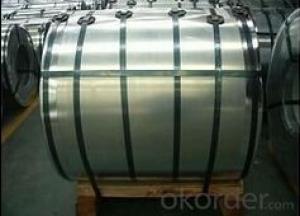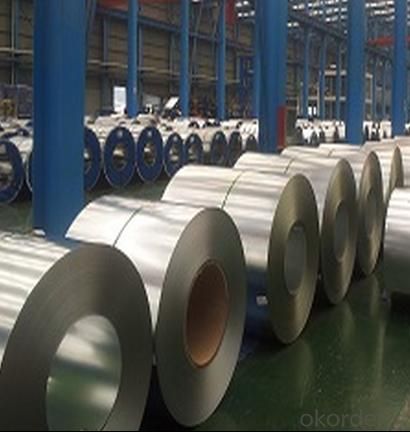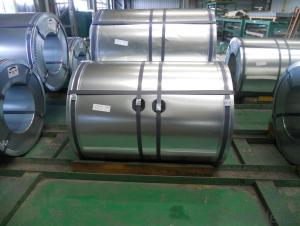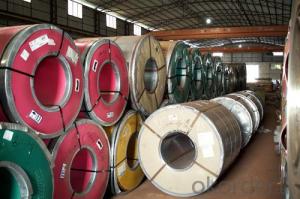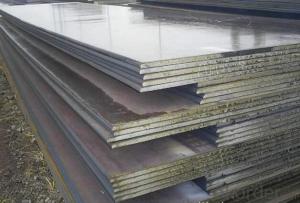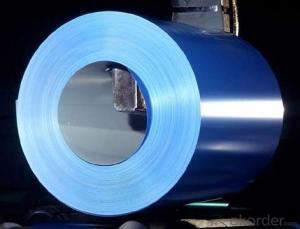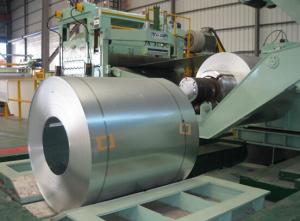High Quality Galvanized Steel Sheet Gi Coil
- Loading Port:
- Tianjin
- Payment Terms:
- TT OR LC
- Min Order Qty:
- 25 m.t.
- Supply Capability:
- 10000 m.t./month
OKorder Service Pledge
OKorder Financial Service
You Might Also Like
Basic Info.
Model NO.:ST010
Surface Treatment:Galvanized
Certification:ISO, SGS, BV, RoHS, IBR
Technique:Cold Rolled
Standard:ASTM, JIS, GB, AISI, DIN
Application:Packing,Gutter Ect.
Edge:Mill
Stock:Stock
Steel Grade:Q195
THK:0.13-3mm
Width:10mm-550mm
Inner Diameter:200mm to 600mm
Export Markets:Global
Additional Info.
Trademark:TRANDA
Packing:Wood Pallets
Standard:OEM
Origin:China
Production Capacity:30000 Tons Each Month
Product Description
1. Thickness: 0.18-1.5mm;
2. Width: 50-914mm;
3. Hardness: 380MPa-450MPa;
4. Specification: 0.35*50, 0.4*45, 0.4*65, 0.4*68, etc.;
5. Surface waxed and edges deburred;
6. Standard: As per buyers' specifications among Q195-Q345B in the GB standard;
7. Package: Inner is protect humidity-proof waw paper, medium is plastic film, outer is sackcloth or compound paper packing, or as per customer's requirements.
| Standard | AISI, ASTM, BS, DIN, GB, JIS, etc |
| Grade | SGCC, DX51D, DX53D, DX54D, etc |
| Thickness | 0.14-2.5mm |
| Width | less than 600mm |
| Inner Diameter | 508/610mm |
| Coil Weight | 1.5-4.0T |
| Zinc Coating | 60g/m 2 -180g/m 2 |
| Spangle State | regular spangle, small spangle, big spangle, non-spangle |
| Surface Treatment | Chromate, Oil, Lacquer Seal, Phosphating, etc |
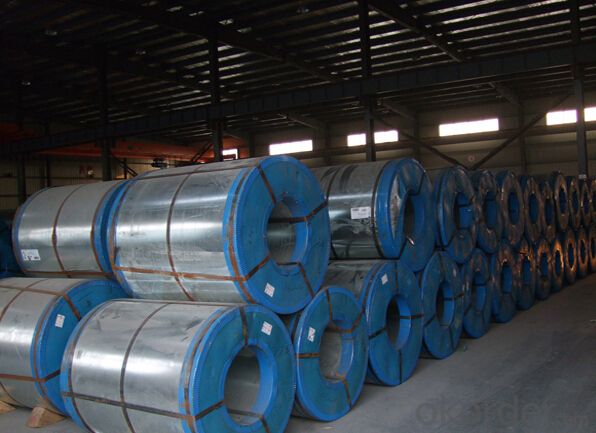
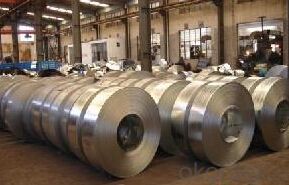
FAQ
1.What's your MOQ?
25MT, it is for one container.
2.Do you have QC teams?
Yeah, sure, our QC team is very important, they will keep the quality control for our products.
3. What's your normal delivery time?
Our delivery time about 10-20days for standard sizes, if you have other requirements like hardness and width ,it is about 20-40days. But don't worry ,we also try our best for the delivery time ,because time longer and our cost is higher.
4.Are the products tested before shipping?
Yes, all of our PPGI and GI was qualified before shipping. We test every batch every day.
- Q: Is steel harder than iron or is iron harder than steel?Please explain... and help!Thanks
- steel is harder than iron Iron is a chemical element. It is a strong, hard, heavy gray metal. It is found in meteorites. Iron is also found combined in many mineral compounds in the earth's crust. Iron rusts easily and can be magnetized and is strongly attracted to magnets. It is used to make many things such as gates and railings. Iron is also used to make steel, an even harder and tougher metal compound. Steel is formed by treating molten (melted) iron with intense heat and mixing it (alloying) with carbon. Steel is used to make machines, cars, tools, knives, and many other things.
- Q: Want to get stainless steel sink. I want quality, durability, quiet, etc. Any suggestions??
- One part of our home is the kitchen, which is usually one of the busiest parts of the home. And part of it is the kitchen sink; as you look at the sink, you can hardly tell how much work is done in the sink. And in our daily activities, most of us use our sink in our own personal needs. Most of the time, we wash our face and clean our clothes, shoes and anything that needs to be washed in our sink. With this kind of job that the sink is going through in its everyday life, sink must be tough enough to take all the pressure of its job. Ordinary sink will not last long when it is use regularly. It may acquire rust, scratches and dent as we have use it in a regular basis, this is why we need to look for a sink that can manage to handle different usage and tasks in our home. In choosing a sink for our home, we must consider the quality and not the price alone. Stainless steel sink is easy to clean; stain and rust are needed not to worry because stainless steel sink is proven a rustproof material. But of course proper care for the sink should always be taken care of to make use of the sink for a very long time. In shopping for a sink, it can be hassle knowing that stainless steel sink is made of heavy material. And the good news is that stainless steel sink can be bought online. You can shop through the internet and you can have the freedom to choose a sink that will fit your kitchen.
- Q: I'm looking for a steel plate for an design project that requires neodymium magnets to be stuck on them. I am trying to figure out what kind of steel plate would have hold the magnets up the best.
- Magnetic okorder / Thus, copper, gold, silver, iron are metals but not alloys if not combined with other elements.
- Q: How are steel coils used in the production of building systems?
- Steel coils are used in the production of building systems by being processed and shaped into various components such as beams, columns, and trusses. These coils are fed into machines that cut, bend, and mold them into the desired shapes, providing structural support and stability to the building.
- Q: Steel roofing info. Pros and cons on steel roofing?
- Steel roofing Pro...life of product is much longer then Asphalt shingles....Looks great...multi colors.......Just love the stuff... Cons....More costly then singles at first but since it last longer it is really a better buy.......
- Q: Why people prefer prefabricated buildings these days? Recently my friend has told me that he is going to owe a steel house so I was just thinking are these steel structures really durable and cheaper than concrete structures?
- It really depends upon the environment and the construction techniques used. Steel that is painted or coated will without maintenance eventually rust. I would expect this tendency to be exacerbated in a humid or shore environment. Heat may tend to cook a steel house and the structure does not add much thermal mass. Construction techniques tend to be fairly quick a part of the construction is essentially prefabricated. Work done in a factory will almost always be cheaper than work done in the field, all things being equal. Concrete can be fairly hi tech with lots of equipment or as seen in many parts of the world fairly low tech with lots of laborers. It is easy to change the characteristics of concrete depending upon how it is mixed, reinforced, and treated during the curing process. Because it is applied in a relatively fluid state it can flow around obstructions like bedrock and be formed up into interesting shapes. A concrete structure can be cooler as it provides thermal mass, and a heat sink. It's resulting rigidity may make it more subject to earthquakes than steel. We do really need to be smarter in constructing our homes to make them fit the land and not only the general environment but our particular micro environment.
- Q: What are the different thickness tolerances for steel coils?
- The specific requirements and industry standards can cause the thickness tolerances for steel coils to vary. There are several common thickness tolerances for steel coils: - The standard tolerance ranges from ±0.005 inches to ±0.010 inches. This means that the actual thickness of the steel coil can deviate within this range from the specified thickness. - Stricter tolerances, known as tighter tolerances, may be necessary in certain cases, particularly for critical applications or industries. These tighter tolerances can range from ±0.002 inches to ±0.005 inches, ensuring more precise thickness control for the steel coils. - Custom thickness tolerances can be defined to meet the specific needs of a project or customer. These custom tolerances can be looser or tighter than the standard or tighter tolerances, depending on the application and desired precision level. It is important to consider that different industries and applications may have their own unique tolerance requirements. For example, industries such as automotive or aerospace may demand tighter tolerances due to the critical nature of their applications, while other industries may accept looser tolerances. Additionally, the specific type of steel being used can also affect the acceptable thickness tolerances. Therefore, consulting the relevant industry standards and specifications is crucial in determining the appropriate thickness tolerances for steel coils in a particular application.
- Q: What does INOX Steel means?I have been looking up the meaning but cannot find it... please help...
- Inox steel is also called stainless steel. It's a metal which does not rust (stainless), almost :- ) It's strong, light, durable and often used in aero-plane industry. But you can find it back in the kitchen as well, most pan are made of INOX.
- Q: Is cold steel actually steel? Does it hurt? Why is it used in training? First one to goodly answer those questions gets 10 points.
- Fluffy blue handcuffs.
- Q: How are steel coils used in the manufacturing of railway wagons?
- Steel coils are used in the manufacturing of railway wagons as they are transformed into various components such as the wagon frames, undercarriages, and body panels. These coils are processed and shaped through cutting, bending, and welding techniques to create the necessary parts for the wagons. The strength and durability of steel make it an ideal material for constructing railway wagons that can withstand heavy loads and harsh conditions on the tracks.
Send your message to us
High Quality Galvanized Steel Sheet Gi Coil
- Loading Port:
- Tianjin
- Payment Terms:
- TT OR LC
- Min Order Qty:
- 25 m.t.
- Supply Capability:
- 10000 m.t./month
OKorder Service Pledge
OKorder Financial Service
Similar products
Hot products
Hot Searches
Related keywords
